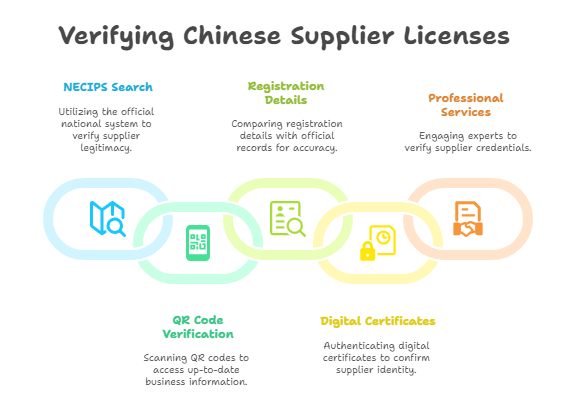For global e-commerce sellers, verifying the legitimacy of Chinese suppliers isn’t just prudent—it’s critical for avoiding scams, customs delays, and financial losses. With China’s updated Company Law (effective July 1, 2024) introducing stricter compliance requirements, here’s how to authenticate a Chinese business license confidently:

1. Official National Enterprise Credit Information Publicity System (NECIPS) Search
What to do:
Visit the government-operated 公示系统 (gsxt.gov.cn) and enter the supplier’s Chinese name or registration number.
What to verify:
- Consistency: Match the company name, address, and legal representative against the license.
- Status: Confirm the business is “存续” (Active), not “吊销” (Revoked) or “注销” (Dissolved).
- Capital & Scope: Check registered capital and business scope align with your order (Article 33, Company Law 2024).
Why it works:
NECIPS is China’s official registry. Data comes directly from local Administrations for Market Regulation (AMRs).
💡 Tip: Look for the “红盾” (red shield) icon on the report—a government authenticity marker.
2. QR Code Verification (New Standard Under 2024 Company Law)
What to do:
Scan the QR code on the supplier’s license using WeChat or Alipay.
What happens:
- Directs you to the official AMR database.
- Displays real-time registration status (Article 33).
Why it matters:
Electronic and paper licenses now hold equal legal validity (Article 33). Counterfeits lack scannable QR codes or link to incorrect data.
3. Cross-Check Registration Details
Verify these key fields:
- Unified Social Credit Code (USCC): 18-digit code (e.g., 91330106MA2JTD****). Validate format here.
- Registered Capital: Confirm if it’s paid-in (实缴) or subscribed (认缴). Under the 2024 law, shareholders must fully pay subscriptions within 5 years (Article 47).
- Business Scope: Ensure your product falls under their permitted scope (Article 9). Illicit operations risk contract invalidation.
4. Digital Certificate Authentication
How it works:
- Suppliers can download e-licenses via the AMR app.
- Verify cryptographic signatures using China’s official CA certificate validation tools.
Key advantage:
Digital licenses are tamper-proof and contain embedded encryption—unforgeable per Article 33.
5. Professional Verification Services
When to use this:
- For high-value orders.
- If the supplier avoids sharing documents.
- When manual checks raise red flags.
What experts provide:
- Official Enterprise Credit Reports: Direct from NECIPS, with government seals.
- Risk Analysis: Legal disputes, ownership changes, or penalties (Article 40).
- English Translations: Legally valid for contracts or disputes.
✅ For reliable verification:
Order an Official Enterprise Credit Report to access authenticated, up-to-date data from Chinese authorities.
Red Flags to Avoid
- Mismatched USCC: Invalid or altered codes.
- Expired/Lapsed Licenses: All licenses must be renewed annually.
- Vague Business Scope: Phrases like “various products” may indicate fraud.
- No Physical Address: Verify locations via satellite imagery or virtual tours.
Why Verification Matters More in 2024
- Stiffer Penalties: Companies using fake licenses face fines up to RMB 2 million and license revocation (Article 250).
- Enhanced Transparency: NECIPS now mandates disclosure of shareholder contributions and contact details (Article 40).
The Smart Alternative: Let Experts Handle Verification
Manual checks require Chinese language skills and legal knowledge. For high-stakes partnerships:
- Request a fresh Official Enterprise Credit Report.
- Verify authenticity via NECIPS QR codes.
- Validate with a professional service like ChinaBizInsight for English reports and compliance assurance.
✳️ Protect your business:
Suspect a fake supplier? Contact our verification team for a risk assessment.
Final Takeaway:
China’s 2024 Company Law boosts license security but scammers still exploit gaps. Combine DIY checks with professional verification to safeguard your supply chain. As cross-border fraud rises (China Customs reported 1,200+ fake exporter cases in Q1 2024 alone), due diligence isn’t optional—it’s essential.
Verify before you trust—your business depends on it.
